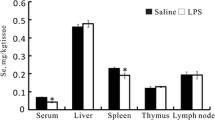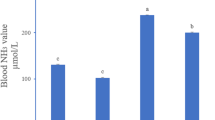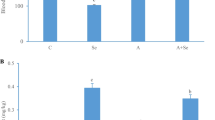Abstract
Selenium (Se) is an essential trace element to maintain homeostasis in humans and animals. The aim of the present study was to clarify the mechanism of Se deficiency-induced inflammation in the pig’s brain. Twenty-four healthy pigs were randomly divided into two groups (n = 12/group): control group (group C) was fed diet with 0.3 mg/kg inorganic Se, and Se-deficient group (group L) was fed diet with 0.007 mg/kg inorganic Se. At the 90th day of the experiment, the histology in the pig’s brain was observed by the microscope, the NO levels and iNOS activity were assayed, and the mRNA and protein expression levels of inflammatory cytokines (iNOS, COX-2, NF-κB, and PTGEs) and HSPs (HSP27, HSP40, HSP60, HSP70, and HSP90) were detected by real-time quantitative PCR and Western blot. Compared with group C, both of NO levels and iNOS activity were increased in group L, and the mRNA and protein expression levels of inflammatory cytokines (iNOS, COX-2, NF-κB, and PTGEs) and HSPs (HSP27, HSP40, HSP60, HSP70, and HSP90) were also upregulated; histological observation displayed inflammatory response in the brain of pig. In summary, diet with Se deficiency can activate the iNOS/NF-κB pathway to upregulate the expression of inflammatory cytokines, thereby leading to inflammatory lesions in the pig’s brain, and HSPs are involved in the compensatory regulation of inflammation. This study provides a reference for the prevention of pig brain inflammation from the perspective of nutrition.




Similar content being viewed by others
References
Yang J, Zhang Y, Hamid S, Cai J et al (2017) Interplay between autophagy and apoptosis in selenium deficient cardiomyocytes in chicken. J Inorg Biochem 170:17–25
Chi Q, Luan Y, Zhang Y, Hu X et al (2019) The regulatory effects of miR-138-5p on selenium deficiency-induced chondrocyte apoptosis are mediated by targeting SelM. Metallomics 11(4):845–857
Sun Z, Xu Z, Wang D, Yao H et al (2018) Selenium deficiency inhibits differentiation and immune function and imbalances the Th1/Th2 of dendritic cells. Metallomics 10(5):759–767
Creech BG, Rahman MM, Reid BL, Couch JR (1958) Exudative diathesis in chicks. J Nutr 64(1):55–65
Yao H, Wu Q, Zhang Z, Zhang J et al (2013) Gene expression of endoplasmic reticulum resident selenoproteins correlates with apoptosis in various muscles of se-deficient chicks. J Nutr 143(5):613–619
Matsuda A, Kimura M, Itokawa Y (1998) Influence of selenium deficiency on vital functions in rats. Biol Trace Elem Res 61(3):287–301
Gudmundson J (1976) The clinicopathological findings of mulberry heart disease in a piglet. Can Vet J La Revue Vétérinaire Canadienne 17(2):45
Huang J, Ren F, Jiang Y, Lei X (2016) Characterization of selenoprotein M and its response to selenium deficiency in chicken brain. Biol Trace Elem Res 170(2):449–458
Sharma SK, Bansal MP, Sandhir R (2019) Altered dietary selenium influences brain iron content and behavioural outcomes. Behav Brain Res 372:112011
Pillai R, Uyehara-Lock JH, Bellinger FP (2014) Selenium and selenoprotein function in brain disorders. IUBMB Life 66(4):229–239
Varikasuvu SR, Prasad VS, Kothapalli J, Manne M (2019) Brain selenium in Alzheimer’s disease (BRAIN SEAD study): a systematic review and meta-analysis. Biol Trace Elem Res 189(2):361–369
Sheng P, Jiang Y, Zhang Z, Zhang J et al (2014) The effect of Se-deficient diet on gene expression of inflammatory cytokines in chicken brain. Biometals 27(1):33–43
Luan Y, Zhao J, Yao H, Zhao X et al (2015) Selenium deficiency influences the mRNA expression of selenoproteins and cytokines in chicken erythrocytes. Biol Trace Elem Res 171(2):427–436
Hu X, Chi Q, Liu Q, Wang D et al (2019) Atmospheric H2S triggers immune damage by activating the TLR-7/MyD88/NF-κB pathway and NLRP3 inflammasome in broiler thymus. Chemosphere 237:124427
Sun X, Li J, Zhao H, Wang Y et al (2018) Synergistic effect of copper and arsenic upon oxidative stress, inflammation and autophagy alterations in brain tissues of Gallus gallus. J Inorg Biochem 178:54
Jing H, Gao X, Xu L, Lin H et al (2019) H2S promotes a glycometabolism disorder by disturbing the Th1/Th2 balance during LPS-induced inflammation in the skeletal muscles of chickens. Chemosphere 222:124–131
Gao X, Zhang Z, Xing H, Yu J et al (2016) Selenium deficiency-induced inflammation and increased expression of regulating inflammatory cytokines in the chicken gastrointestinal tract. Biol Trace Elem Res 173(1):210–218
Liu T, Yang T, Pan T, Liu C et al (2017) Effect of low-selenium/high-fat diet on pig peripheral blood lymphocytes: perspectives from selenoproteins, heat shock proteins, and cytokines. Biol Trace Elem Res 183(3):1–12
Zamamiri-Davis F, Lu Y, Thompson JT, Prabhu KS et al (2002) Nuclear factor-κB mediates over-expression of cyclooxygenase-2 during activation of RAW 264.7 macrophages in selenium deficiency. Free Radic Biol Med 32(9):890–897
Zhao J, Xing H, Liu C, Zhang Z et al (2016) Effect of selenium deficiency on nitric oxide and heat shock proteins in chicken erythrocytes. Biol Trace Elem Res 171(1):208–213
Khoso PA, Liu C, Liu C, Khoso MH et al (2016) Selenium deficiency activates heat shock protein expression in chicken spleen and thymus. Biol Trace Elem Res 173(2):1–9
Chen X, Zhu Y, Cheng X, Zhang Z et al (2012) The protection of selenium against cadmium-induced cytotoxicity via the heat shock protein pathway in chicken splenic lymphocytes. Molecules 17(12):14565–14572
Hoffman RA, Mahidhara RS, Wolf-Johnston AS, Lu L et al (2002) Differential modulation of CD4 and CD8 T-cell proliferation by induction of nitric oxide synthesis in antigen presenting cells. Transplantation 74(6):836–845
Kim IY, Stadtman TC (1997) Inhibition of NF-kappaB DNA binding and nitric oxide induction in human T cells and lung adenocarcinoma cells by selenite treatment. Proc Natl Acad Sci U S A 94(24):12904–12907
Christopherson KS, Bredt DS (1997) Nitric oxide in excitable tissues: physiological roles and disease. J Clin Investig 100(10):2424–2429
Miller MJ, Grisham MB (1995) Nitric oxide as a mediator of inflammation?-You had better believe it. Mediat Inflamm 4(6):387–396
Abate A, Oberle S, Schröder H (1998) Lipopolysaccharide-induced expression of cyclooxygenase-2 in mouse macrophages is inhibited by chloromethylketones and a direct inhibitor of NF- κB translocation. Prostag Oth Lipid M 56(5-6):277
Lee YW, Han S, Lee M, Yang K et al (2000) 2-Amino-3-methylimidazo[4,5-f]quinoline inhibits nitric oxide production in lipopolysaccharide-stimulated RAW 264.7 cells by blocking p38 kinase activation. Cancer Lett 156(2):133–139
Park JS, Choi HI, Bae EH, Ma SK et al (2017) Small heterodimer partner attenuates hydrogen peroxide-induced expression of cyclooxygenase-2 and inducible nitric oxide synthase by suppression of activator protein-1 and nuclear factor-κB in renal proximal tubule epithelial cells. Int J Mol Med 39(3):701–710
Gao D, Jing S, Zhang Q, Wu G (2018) Pterostilbene protects against acute renal ischemia reperfusion injury and inhibits oxidative stress, inducible nitric oxide synthase expression and inflammation in rats via the Toll-like receptor 4/nuclear factor-κB signaling pathway. Exp Ther Med 15(1):1029–1035
Takano M, Ohkusa M, Otani M, Min KS et al (2015) Lipid A-activated inducible nitric oxide synthase expression via nuclear factor-κB in mouse choroid plexus cells. Immunol Lett 167(2):57–62
Raish M, Ahmad A, Ansari MA, Alkharfy KM et al (2018) Momordica charantia polysaccharides ameliorate oxidative stress, inflammation, and apoptosis in ethanol-induced gastritis in mucosa through NF-kB signaling pathway inhibition. Int J Biol Macromol 111:193
Chen Y, Arrigo AP, Currie RW (2004) Heat shock treatment suppresses angiotensin II-induced activation of NF-kappaB pathway and heart inflammation: a role for IKK depletion by heat shock? Am J Physiol Heart Circ Physiol 287(3):1104–1114
Jo S-K, Ko GJ, Boo CS, Cho WY et al (2006) Heat preconditioning attenuates renal injury in ischemic ARF in rats: role of heat-shock protein 70 on NF-kappaB-mediated inflammation and on tubular cell injury. J Am Soc Nephrol 17(11):3082
Zheng Z, Kim JY, Ma H, Lee JE et al (2008) Anti-inflammatory effects of the 70 kDa heat shock protein in experimental stroke. J Cereb Blood Flow Metab 28(1):53–63
Yao H, Wu Q, Zhang Z, Li S et al (2013) Selenoprotein W serves as an antioxidant in chicken myoblasts. Biochim Biophys Acta 1830(4):3112–3120
Yang T, Liu T, Cao C, Xu S (2019) miR-200a-5p augments cardiomyocyte hypertrophy induced by glucose metabolism disorder via the regulation of selenoproteins. J Cell Physiol 234(4):4095–4103
Yu J, Yao H, Gao X, Zhang Z et al (2015) The role of nitric oxide and oxidative stress in intestinal damage induced by selenium deficiency in chickens. Biol Trace Elem Res 163(1-2):144–153
Jin X, Jia T, Liu R, Xu S (2018) The antagonistic effect of selenium on cadmium-induced apoptosis via PPAR-γ/PI3K/Akt pathway in chicken pancreas. J Hazard Mater 357:355–362
Zheng S, Jin X, Chen M, Shi Q et al (2019) Hydrogen sulfide exposure induces jejunum injury via CYP450s/ROS pathway in broilers. Chemosphere 214:25–34
Shi Q, Wang W, Chen M, Zhang H et al (2019) Ammonia induces Treg/Th1 imbalance with triggered NF-κB pathway leading to chicken respiratory inflammation response. Sci Total Environ 659:354–362
Wang W, Chen M, Jin X, Li X et al (2018) H 2 S induces Th1/Th2 imbalance with triggered NF-κB pathway to exacerbate LPS-induce chicken pneumonia response. Chemosphere 208:241–246
Jo MJ, Lee JR, Cho IJ, Kim YW et al (2013) Roots of Erigeron annuus attenuate acute inflammation as mediated with the inhibition of NF- κ B-associated nitric oxide and prostaglandin E2 production. Evid-Based Compl Alt Med 2013(1):297427
Hwangbo M, Jung JY, Ki SH, Park SM et al (2014) U-Bang-Haequi Tang: A herbal prescription that prevents acute inflammation through inhibition of NF-κB-mediated inducible nitric oxide synthase. Evid-Based Compl Alt Med 2014:542825
Hwang JW, Jeon YT, Lim YJ, Park HP (2017) Sevoflurane postconditioning-induced anti-inflammation via inhibition of the toll-like receptor-4/nuclear factor kappa B pathway contributes to neuroprotection against transient global cerebral ischemia in rats. Int J Mol Sci 18(11):2347
Zhao P, Guo Y, Zhang W, Chai H et al (2017) Neurotoxicity induced by arsenic in Gallus gallus: regulation of oxidative stress and heat shock protein response. Chemosphere 166:238–245
Chen M, Li X, Shi Q, Zhang Z et al (2019) Hydrogen sulfide exposure triggers chicken trachea inflammatory injury through oxidative stress-mediated FOS/IL8 signaling. J Hazard Mater 368:243–254
Su Y, Wei H, Bi Y, Wang Y et al (2019) Pre-cold acclimation improves the immune function of trachea and resistance to cold stress in broilers. J Cell Physiol 234(5):7198–7212
Liu Z, Yao X, Du J, Song B et al (2017) Selenium deficiency augments the levels of inflammatory factors and heat shock proteins via the redox regulatory pathway in the skeletal muscles of mice. Biol Trace Elem Res 182(13):1–8
Tao Y, Hart J, Lichtenstein L, Joseph LJ et al (2009) Inducible heat shock protein 70 prevents multifocal flat dysplastic lesions and invasive tumors in an inflammatory model of colon cancer. Carcinogenesis 30(1):175–182
Targosz A, Brzozowski T, Pierzchalski P, Szczyrk U et al (2012) Helicobacter pylori promotes apoptosis, activates cyclooxygenase (COX)-2 and inhibits heat shock protein HSP70 in gastric cancer epithelial cells. Inflamm Res 61(9):955–966
Luo S, Wang T, Qin H, Lei H et al (2011) Obligatory role of heat shock protein 90 in iNOS induction. Am J Physiol Cell Physiol 301(1):C227
Acknowledgments
The study was supported by the Earmarked Fund for China Agriculture Research System (no. CARS 35).
Conflict of Interest
The authors declare that they have no conflict of interest.
Author information
Authors and Affiliations
Corresponding author
Additional information
Publisher’s Note
Springer Nature remains neutral with regard to jurisdictional claims in published maps and institutional affiliations.
Rights and permissions
About this article
Cite this article
Zhang, Y., Cui, J., Lu, Y. et al. Selenium Deficiency Induces Inflammation via the iNOS/NF-κB Pathway in the Brain of Pigs. Biol Trace Elem Res 196, 103–109 (2020). https://doi.org/10.1007/s12011-019-01908-y
Received:
Accepted:
Published:
Issue Date:
DOI: https://doi.org/10.1007/s12011-019-01908-y




